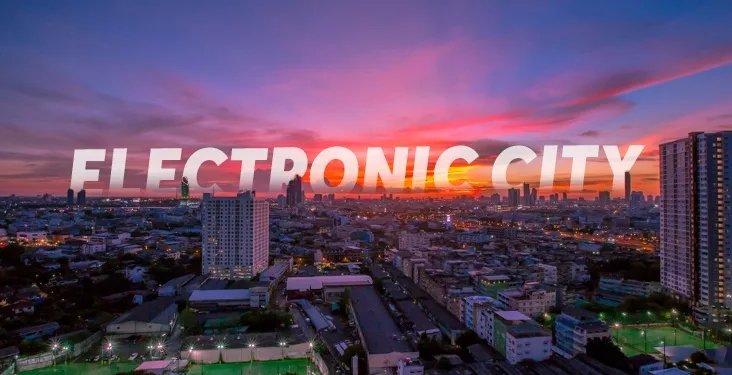The Booming Micro-Market of Electronic City in Bangalore
Read latest blogs and articles from Housystan

The Information mentioned here was last updated on:
29/1/2026The Booming Micro-Market of Electronic City in Bangalore
In recent years, Electronic City in Bangalore has rapidly emerged as a key micro-market within the broader real estate landscape of the city. Known for its technological prowess and home to some of the largest IT companies in the world, Electronic City is not just an IT hub but also a promising residential destination. This article delves into the factors driving the growth of this vibrant area, the real estate opportunities it presents, and its appeal to both businesses and residents alike.
The Rise of Electronic City
- Verified Tenants/Buyers
- Unlimited Property Listing
- Zero subscription/charges fee
Strategic Location:
Electronic City is strategically located in the southern part of Bangalore, offering excellent connectivity to key areas:
- Proximity to Hosur Road: Offers seamless access to other parts of Bangalore.
- Connectivity to the NICE Road: Improves commute times to peripheral locations and economic hubs.
- Upcoming Metro Line: Expected to further boost connectivity, making it an even more desirable location.
IT and Business Hub:
- Home to IT Giants: Acts as the headquarters for major IT corporations such as Infosys, Wipro, and Tech Mahindra.
- SEZs (Special Economic Zones): Host to several SEZs that encourage international business and investment.
- Innovation and Start-Ups: Emerging as a fertile ground for startups, thanks to its vibrant ecosystem and supportive infrastructure.
Why Electronic City Appeals to Residents
Affordable Housing Options:
Electronic City offers a variety of residential options, catering to diverse budgets:
- Competitive Pricing: Real estate prices tend to be more affordable compared to the rest of Bangalore, making it attractive to young professionals and families.
- Diverse Property Types: Ranges from compact studio apartments to spacious villas, catering to different lifestyle needs.
Quality of Life:
- Green Spaces: Abundance of parks and recreational areas offer an escape from the hustle of city life.
- Educational Institutions: Presence of reputed schools and colleges enriches the community life. Notable names include:
- VIBGYOR High School
- PES University
- Healthcare Facilities: Proximity to hospitals and clinics ensures quality healthcare services for residents.
Amenities and Lifestyle:
The locality is rich in lifestyle amenities that enhance the quality of life:
- Shopping and Entertainment: The area is dotted with malls, multiplexes, and markets that cater to everyday needs and leisure.
- Dining Options: Hosts a variety of restaurants and cafes, offering a diverse gastronomic experience.
- Fitness and Recreation: Gyms, sports complexes, and swimming pools cater to fitness enthusiasts.
The Real Estate Market Landscape
Current Trends:
The real estate market in Electronic City is witnessing several trends:
- Rise in Demand: The influx of IT professionals has stimulated rental and sales markets.
- Appreciation Potential: Property values have seen consistent growth owing to sustained demand.
- Investment Opportunities: Investors are eyeing both commercial and residential properties for stable returns.
Notable Real Estate Projects:
Some of the significant real estate developments in Electronic City include:
- Godrej E-City: Known for its eco-friendly architecture and sustainable design features.
- Ajmera Infinity: Offers a blend of modern amenities and spacious living.
- Sobha Silicon Oasis: Features luxurious apartments with contemporary finishes.
Infrastructure and Future Developments
Infrastructure Growth:
Electronic City's infrastructure is set to see considerable enhancements:
- Upcoming Metro Line: The extension of the Namma Metro is expected to streamline traffic and enhance connectivity.
- Road Widening Initiatives: Ongoing road works aim to tackle congestion and improve travel efficiency.
Planned Developments:
Several planned developments promise to boost the area’s infrastructure:
- Smart City Mission Projects: Aimed at integrating smart solutions to urban challenges.
- Tech Parks and Business Centers: Expansion of existing parks and introduction of new business facilities.
Attracting Investments
Government Policies:
Supportive government policies play a pivotal role in attracting investors:
- Revised FDI Norms: Encourage foreign direct investment in real estate and businesses.
- Tax Incentives in SEZs: Draw international firms to set up operations in the area.
Favorable Business Environment:
- Ease of Doing Business: Streamlined procedures and supportive regulations enhance business operations.
- Talent Pool: Abundance of skilled professionals facilitates business expansions and innovations.
The Local Economy and Employment
Job Creation:
Electronic City fosters employment across several sectors:
- IT and Software Development: Continues to be the predominant sector with constant growth and innovation.
- Manufacturing and R&D: Increasing investment in research, development, and manufacturing units.
Economic Impact:
- Contribution to Bangalore’s GDP: The growth of Electronic City significantly contributes to the city’s economy.
- Increased Consumerism: Rise in disposable incomes creates a vibrant retail and service sector.
Enjoying Electronic City
Community and Culture:
A diverse community characterizes Electronic City:
- Cultural Fests and Events: Regular events promote cultural vibrancy and community bonding.
- Community Initiatives: Various resident welfare associations work towards enhancing neighborhood well-being.
Leisure and Lifestyle Activities:
Electronic City is a diverse haven for social and leisure activities:
- Music and Arts: Presence of cultural centers providing avenues for creative expression.
- Travel and Exploration: Proximity to scenic destinations around Bangalore invites people to explore.
Exploring Electronic City offers a peek into the future of urban living, with its seamless blend of work, life, and play. As it continues to grow and evolve, it promises a rich tapestry of opportunities for residents, businesses, and investors, making it a focal point for growth in Bangalore's dynamic real estate scene.